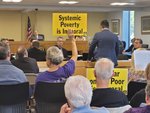






A decision may be made on an electricity rate hike as early as the end of this week.
In the meantime, Ocean State residents, advocates and politicians took turns making impassioned pleas to regulators, urging them to reject a nearly 47 percent winter electric rate hike.
“This sledgehammer approach … lacks creativity, but most of all, it lacks empathy,” Rev. Dr. Donnie Anderson told the Rhode Island Division of Public Utilities and Carriers (DPUC) at a public hearing on Friday. “Disproportionately it affects the people who can least afford it. And make no mistake; this rate increase will result in increased homelessness and in people dying. That’s a reality you must face. And I appreciate that you have a responsibility to the State of Rhode Island and to the laws of the State of Rhode Island, but we all are subject to a higher authority that demands we treat each other ethically and with equity. And I urge you to reject this proposal.”
The Rationale
Earlier this year, the DPUC permitted the acquisition of Rhode Island power provider Narragansett Electric Company (NEC) (formerly owned by National Grid), by Pennsylvania power company PPL (formerly known as Pennsylvania Power and Light), forming a new company, Rhode Island Energy.
Jeffrey D. Oliveira, PPL Corporation Regulatory Programs Specialist, and James Ruebenacker, Manager of Wholesale Electric Supply, New England for National Grid, delivered testimony supporting the rate hike.
The two experts estimated that a “typical bill analysis” would “result in a monthly bill increase of $51.95, or 46.7% when compared to the customer’s bill based on currently-effective rates.”
“For the same customer, the proposed base residential LRS rate would result in a monthly bill increase of $35.99, or 28.5%, when compared to the customer’s bill based on last winter’s rates,” they testified.
During hearings on the sale, PPL promised regulators that their acquisition of the state’s primary power provider (they provide electricity to more than 97 percent of Rhode Island’s electric customers). They had to show the DPUC that their purchase of the company would be in the public interest.
The Opposition
Many of the same voices warned the commission prior to the utility sale. The Rhode Island Attorney General’s Office first objected to the sale but eventually acquiesced after the company pledged a series of concessions.
“Energy bills in Rhode Island are essentially comprised of two distinct charges: a charge for obtaining a supply of energy, and a charge for distribution, that is, delivering that energy to customers. The former is a pass-through charge to ratepayers, from which Rhode Island Energy, like National Grid before it, cannot profit,” Rhode Island Attorney General Peter F. Neronha said. “The latter charge — for energy distribution — is where Rhode Island Energy can profit. Thus, the fight for fair and reasonable energy prices for Rhode Islanders must be fought on the energy distribution side. That is why it was critical for this Office earlier this year to intervene in the sale of National Grid to Rhode Island Energy and secure not only a three-year freeze in energy distribution rates but more than $200 million in energy distribution relief for Rhode Islanders. Those successes should mitigate some of the impact of increased energy supply charges this winter. But there is still more that the PUC can and should do, including giving ratepayers the option to defer payment of some of the increased supply cost until next year and re-allocating certain existing state funds to provide some relief.”
The AG’s Office contends that “although Rhode Island Energy is not permitted to profit from supplying energy, Rhode Islanders will nevertheless face increased rates on their bills,” according to a press release from state’s top prosecutor.
“These market conditions hit at a tough time for Rhode Island consumers, whose household budgets have been upended by inflation in gasoline, food, and other essential consumer goods,” according to the AG’s Office. “In May … (the AG) objected to the sale of (NEC) by National Grid to PPL Corporation, now Rhode Island Energy, ultimately leading to an agreement that secures $200 million in value for Rhode Island ratepayers along with mandated steps toward meeting Act on Climate goals. The benefits secured in that agreement will reduce this winter’s electric bills. Each consumer, regardless of income, will receive $63.72 in direct rate relief for use in the winter months.”
Besides the “direct ratepayer relief, the Attorney General required that PPL forgo recovery of $103 million from ratepayers: $82 million in costs for new investments it will make as a result of the sale and $21 million of costs already incurred by National Grid. The DPUC’s decision would have allowed Rhode Island Energy to seek this $103 million from ratepayers. Also as a result of the agreement, there will be no increase in distribution charges for the next three years,” according to Neronha.
‘Historic Increase’
Why does the Ocean State’s new electric company want to jack rates so high?
“The same market fundamentals that impacted last winter continue to exist for the upcoming pricing period of October 2022 through March 2023,” contend the PPL experts. “In addition to those market fundaments, beginning in early 2022 natural gas prices began to increase in response to the war in the Ukraine which reduced expected supply from Russia and significantly increased demand for LNG globally. Compared to the recently concluded winter, the increase in LNG demand and continuing market fundamentals from the prior year resulted in increased natural gas prices for the upcoming winter, and therefore results in higher electric prices and winter LRS rates.”
The DPUC heard public testimony last Friday, and continued the evidentiary hearing through Monday.
Thomas F. Kogut, Associate Administrator Cable TV and Legislative Liaison for the Division of Public Utilities and Carriers, estimated that the board may publicize a meeting any day, where the vote on electric rates will take place publicly.
“As things stand now the most definitive thing I can say about electric rate timing is as soon as the end of this week,” Kogut said Tuesday. “The gas rates would go into effect on Nov. 1 with a PUC decision mid to late October.”
The three-member PUC includes Chairman Ronald T. Gerwatowski, and Commissioners Abigail Anthony and John C. Revens Jr.
“At some point, before we make a decision, we would put an open meeting notice up, and it would be clear when that would be on the decision,” Gerwatowski said to begin Monday morning’s hearing.
Governor’s Proposal
Rhode Island Gov. Dan McKee spoke to begin Friday’s round of emotional testimony.
“This surge in electricity costs this winter are going to impact all Rhode Islanders,” McKee said in a recent press release. “Our most vulnerable residents do not have the means to absorb this rate increase. We have a responsibility to do everything possible to protect them.”
The governor’s office proposed using $3.8 million from the state’s Regional Greenhouse Gas Initiative (RGGI) funds “to provide direct rate relief to low-income utility customers who are most at risk this winter.”
“This will help ease the burden of higher-than-average electricity prices and continue our commitment to provide relief to Rhode Islanders in the face of rising prices and inflation,” according to a press release from McKee’s office.
House Minority Leader Michael Chippendale issued a statement last week in response to McKee’s testimony and request for additional federal funding for the Low Income Home Energy Assistance Program (LIHEAP), and a request to repeal the 4 percent tax on gross earnings on electric utilities.
“This is not a surprise to Republicans that the Governor would now try to address the underfunding of LIHEAP and the massive effect inflation, and our state and national energy policy is having on the users of this critical resource,” Chippendale said.
‘War on the Poor’
Peter Nightingale, a professor in the University of Rhode Island’s Department of Physics, passed signs out to the audience, bearing messages like “The War on the Poor is Immoral” and “Systemic Poverty is Immoral.”
“My bottom line is, that the Rhode Island Congressional Delegation, is responsible for and should be held accountable for the rate increases that are happening in energy,” Nightingale. “You can do what is right, or you can wash your hands in innocence. And if that sounds Biblical to you, you may be onto something.”
Lorraine Savard, of Central Falls, also took aim at politicians with deep ties to the fossil fuel industry, and the public utility companies that have profited from the pollution of the planet.
“The fossil fuel industry is on the brink of becoming obsolete … Rhode Island Energy is following their cousins, the fuel companies, in cashing in on their ultimate demise,” Savard said. “Rhode Island Energy, provider, supplier, distributor, is asking to raise the cost of electricity and gas. This is unconscionable. We have too long subsidized the industry. Now is the time to allow the fossil fuel cabal to exit gracefully, not greedily. There are other ways to save money. The easy way is to raise fees. I say to Rhode Island Energy, do as the working families and small businesses have been doing for months. Be creative. Find other ways to raise money.”
Savard’s comments triggered a round of applause from supporters in the audience.
‘Reject the hike’
Rhode Island state Rep. David Morales, District 7-Providence, urged the DPUC to “reject the historic level rate hikes.”
“I wanted to remind us how exactly we got here,” Morales told the crowd. “Over five months ago, after a continuous year where Rhode Island Energy was trying to acquire Narragansett Energy, or National Grid, they continued to show up to (DPUC hearings), and continuously said that they were committed to the community of Rhode Island; that they were committed to the working people of our state, if they had the opportunity to acquire the assets. And sure enough, over $4 billion later, and not even a year (of) having control of our public utility system, they’re putting forward historic level rate hikes that are going to hurt people from an economic standpoint … the reality is, everything that you have heard from the diverse coalition of the people behind me is exactly what is going to happen if these rate hikes go into affect on Oct. 1.”
Morales acknowledged that public assistance programs will help some, but not nearly enough struggling rate-payers.
“Some of the different programs that exist to provide relief, they’re not adequate by any stretch of the imagination … The eligibility to qualify as a low income energy customer are very stringent,” Morales explained. “It is essentially 60 percent of the area median income. Therefore, if you are an individual, earning 70 percent of the area median income, if you are a working family of four making $70,000, you do not qualify for any of these programs; whether it be LIHEAP, whether it be some sort of bill credits, therefore we are not going to see actual relief for working people. Instead, what we are going to continue to see is the cycle of debt being accumulated.”
Morales delivered a direct challenge to the RI Energy lawyers seated comfortably behind a large wooden barrier that separates the public from the commission and large groups of suit-clad attorneys.
“That is why I call on Rhode Island Energy, directly, to absorb some of the costs of the increase in energy prices that we are seeing,” Morales said loudly, commanding the room’s attention. “Because the ultimate goal was that Rhode Island Energy would be committed to our state … and after absorbing (the) costs, they will be able to talk to their economic advisors on how they can withdraw this rate hike, and instead be in a position to show us that they are In fact different than National Grid. That they were more committed, that they were going to provide better services. And by the way, customer service hasn’t approved at the level in which we were promised either … But unsurprisingly … they did not withdraw their proposed rate hikes. And that is why now we are having to call on the Public Utilities Commission to once again mark this case as being extraordinary, and to simply reject the rate hikes.”
Comments
No comments on this item Please log in to comment by clicking here